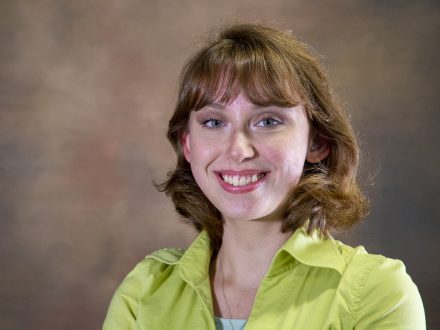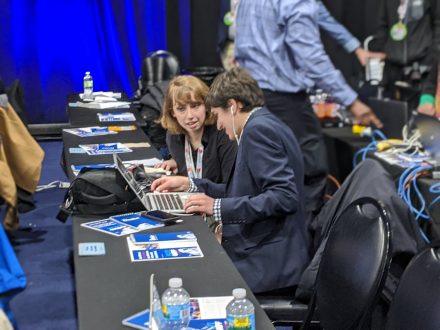This column by Emery Eisner '22 focuses on her experience covering the Iowa Caucuses during the Winter Term course "Iowa: The Trail Starts Here" in January. The column was published by The Burlington Times-News.
By Emery Eisner ’22
It was about 30 minutes after presidential candidate Tom Steyer “just wanted to say hi” to competitor Bernie Sanders during the Jan. 14 Democratic debate in Des Moines, Iowa that I was shoved into Steyer by a mob of desperate reporters in the CNN spin room.

As the adrenaline rushed through me on that chaotic night, I recalled a piece of advice I heard from my advisor, Associate Professor Rich Landesberg, early in my Elon career: “Find what makes your heart beat faster.”
The cacophony of voices in a press gaggle might not seem glamorous to some, but seeing a politician look you in the eyes as he answers your question, one that hasn’t yet been asked of him, is intoxicating.
I found myself face-to-face with the candidates thanks to “Iowa: The Trail Starts Here,” a Winter Term class called led by Landesberg and Assistant Professor Mark Dalhouse. Students chose either a political track, working for a campaign of their choice, or a journalism track, covering various events in the Des Moines area and across Iowa.
The course was designed to help us become intimately familiar with the political process – any later chaos of the caucuses aside.
By the end, many of us were more comfortable with the unique structure of the caucuses than some native Iowans we interviewed. Of course, you could do a quick Google search and take an Iowa Caucuses crash course in minutes. But what we experienced was deeper than just gaining an understanding of the mechanics of the system.
I think it’s safe to say I learned the most from the voters, and their apparent bond – or lack thereof – with each of the candidates. It’s called “retail politics” for a reason, right? Politicians don’t just advertise themselves on a grand scale — they have to sell themselves to every single voter in Iowa. They get up close and personal with voters, sparking an intense passion in citizens.
At a town hall for candidate Andrew Yang, I met an Iowan waiting in line for the event. He was in tears at the prospect of participating in his first caucus, and said he was attending several events to try and narrow his decision.
 Seeing the candidates in person holds real power for Iowans, who are keenly aware of their influential role as the first voters in the nation. By the end of Yang’s speech and a Q&A session during which audience members chanted for Yang multiple times, the man said he was going to volunteer for the campaign.
Seeing the candidates in person holds real power for Iowans, who are keenly aware of their influential role as the first voters in the nation. By the end of Yang’s speech and a Q&A session during which audience members chanted for Yang multiple times, the man said he was going to volunteer for the campaign.
At other events, those of us reporting could see a window into how voters across the nation may be feeling. At a Bernie Sanders rally we covered, I spoke with an Iowan making his final decision between caucusing for Sanders or voting for Trump as he did in 2016. He told us that when Sanders failed to gain the Democratic nomination, he moved over to Trump rather than voting for establishment candidate Hillary Clinton. After three years of Trump in office, the man said he is not impressed with the president’s online persona and demeanor on sites like Twitter.
Back home in North Carolina, this anecdote often draws the most scrutiny, since Trump and Sanders are so ideologically different. But seeing how many Iowans were dissatisfied with the political system four years ago and continue to be dissatisfied today, that bridge of support isn’t such a large stretch. Voters will take whoever can promise widespread change, whether that person emerges from the left or right side of the aisle.
Being in Iowa, it was easy to see why natives of the state feel so protective of their position kicking off the presidential race. In most places across the U.S., politics is an impersonal game.
But when a candidate can genuinely see you, it feels like a different game entirely. I saw the voters interact with the candidates, and I felt that same excitement as a member of the press.
There’s nothing like it.
—
Emery Eisner is majoring in journalism and political science, and serves as the editor-in-chief of the 2020 Phi Psi Cli Yearbook.
Views expressed in this column are the author’s own and not necessarily those of Elon University.


